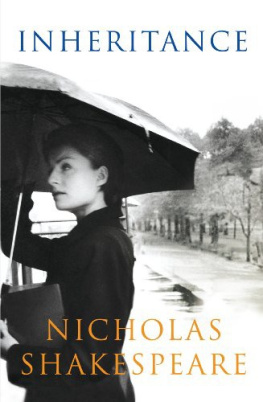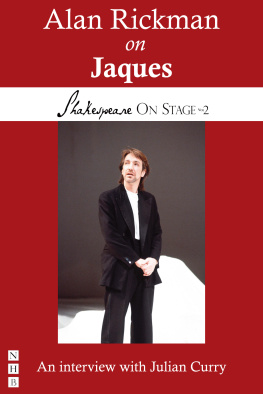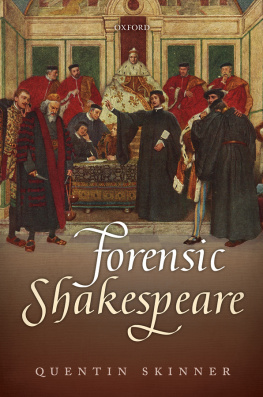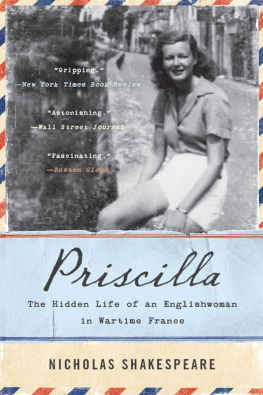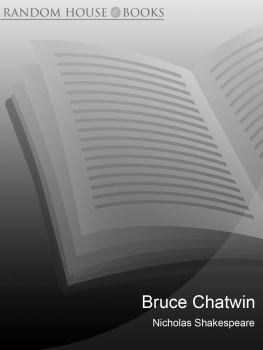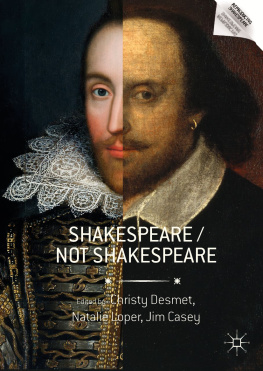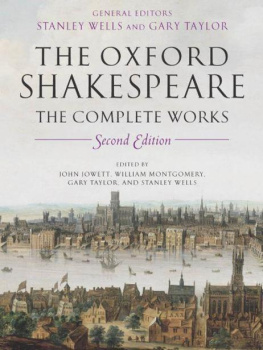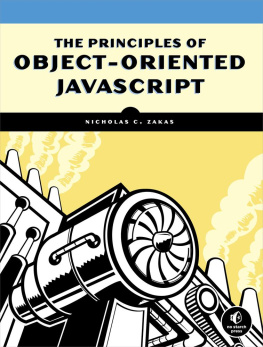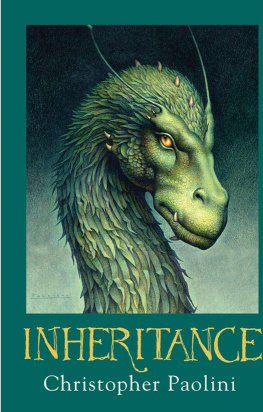Nicholas Shakespeare - Inheritance
Here you can read online Nicholas Shakespeare - Inheritance full text of the book (entire story) in english for free. Download pdf and epub, get meaning, cover and reviews about this ebook. year: 2010, publisher: Harvill Secker, genre: Detective and thriller. Description of the work, (preface) as well as reviews are available. Best literature library LitArk.com created for fans of good reading and offers a wide selection of genres:
Romance novel
Science fiction
Adventure
Detective
Science
History
Home and family
Prose
Art
Politics
Computer
Non-fiction
Religion
Business
Children
Humor
Choose a favorite category and find really read worthwhile books. Enjoy immersion in the world of imagination, feel the emotions of the characters or learn something new for yourself, make an fascinating discovery.
- Book:Inheritance
- Author:
- Publisher:Harvill Secker
- Genre:
- Year:2010
- Rating:3 / 5
- Favourites:Add to favourites
- Your mark:
- 60
- 1
- 2
- 3
- 4
- 5
Inheritance: summary, description and annotation
We offer to read an annotation, description, summary or preface (depends on what the author of the book "Inheritance" wrote himself). If you haven't found the necessary information about the book — write in the comments, we will try to find it.
Inheritance — read online for free the complete book (whole text) full work
Below is the text of the book, divided by pages. System saving the place of the last page read, allows you to conveniently read the book "Inheritance" online for free, without having to search again every time where you left off. Put a bookmark, and you can go to the page where you finished reading at any time.
Font size:
Interval:
Bookmark:
Table of Contents
This eBook is copyright material and must not be copied, reproduced, transferred, distributed, leased, licensed or publicly performed or used in any way except as specifically permitted in writing by the publishers, as allowed under the terms and conditions under which it was purchased or as strictly permitted by applicable copyright law. Any unauthorised distribution or use of this text may be a direct infringement of the author's and publisher's rights and those responsible may be liable in law accordingly.
Epub ISBN: 9781407051635
Version 1.0
www.randomhouse.co.uk
Published by Harvill Secker 2010
2 4 6 8 10 9 7 5 3 1
Copyright (c) Nicholas Shakespeare 2010
Nicholas Shakespeare has asserted his right under the Copyright, Designs and Patents Act 1988 to be identified as the author of this work
This book is sold subject to the condition that it shall not, by way of trade or otherwise, be lent, resold, hired out, or otherwise circulated without the publisher's prior consent in any form of binding or cover other than that in which it is published and without a similar condition including this condition being imposed on the subsequent purchaser
First published in Great Britain in 2010 by
HARVILL SECKER
Random House, 20 Vauxhall Bridge Road
London SW1V 2SA
www.rbooks.co.uk
Addresses for companies within The Random House Group Limited can be found at: www.randomhouse.co.uk/offices.htm
The Random House Group Limited Reg. No. 954009
A CIP catalogue record for this book is available from the British Library
ISBN 9781846553158 (hardback)
ISBN 9781846553165 (trade paperback)
This book is a work of fiction. Any resemblance between fictional characters in this book and actual persons living or dead is entirely coincidental
The Random House Group Limited supports The Forest Stewardship
Council (FSC), the leading international forest certification organisation. All our titles that are printed on Greenpeace approved FSC certified paper carry the FSC logo. Our paper procurement policy can be found at www.rbooks.co.uk/environment
Typeset in Sabon by Palimpsest Book Production Limited,
Grangemouth, Stirlingshire
Printed and bound in Great Britain by
Clays Ltd, St Ives plc
ALSO BY
Nicholas Shakespeare
Fiction
The Vision of Elena Silves
The High Flyer
The Dancer Upstairs
Snowleg
Secrets of the Sea
Non-fiction
Bruce Chatwin
In Tasmania
AUTHOR BIOGRAPHY
N ICHOLAS S HAKESPEARE WAS BORN in 1957. The son of a diplomat, much of his youth was spent in the Far East and South America. His novels have been translated into twenty languages. They include The Vision of Elena Silves , winner of the Somerset Maugham Award, Snowleg and The Dancer Upstairs , which was chosen by the American Libraries Association in 1997 as the year's best novel, and in 2001 was made into a film of the same name by John Malkovich. His most recent novel is Secrets of the Sea . He is married with two small boys and currently lives in Oxford.
To Jon
Everything that begins as comedy ends as a dirge in the void.
Roberto Bolano, The Savage Detectives
ACKNOWLEDGEMENTS
M URRAY B AIL FOR THE idea; Robert Sykes of Parker Bullen for giving it legal legs; Vergine Gulbenkian for helping me to understand Armenia; Rob Libby for turning up at the right time; Mike Rikard-Bell and Bill Howroyd for their experiences of the Pilbara; Don Forrest and Judith Street for memories of Perth; the late Angela Geraghty for details of a bush fire; Gillon Aitken, Niko Hansen, Nigel Horne, Christopher MacLehose, Charlotte Metcalfe, Nick Robinson and Rachael Rose for comments on the text. I would like also to thank Jonathan Beswick, Piers Litherland, Ronnie Lloyd, Ellen O'Halligan, Julia Pilgrim, Susan Richards, Amanda Shakespeare, David Willis and Francesca Zaenglein. Above all, I am grateful to Peter Washington for his red pen, my wife Gillian for her unstinting support and my editor James Gurbutt for his loyalty.
This is a work of fiction and not one of the characters is a real person; nor is Carpe Diem based on any publishing house. Krikor Makertich's discovery was sparked by an interest in the 1952 flight of Lang Hancock, well told in Neill Phillipson's Man of Iron (1974) and Richard Duffield's Rogue Bull: The Story of Lang Hancock, King of the Pilbara (1979). I would also like to pay tribute to Michael J. Arlen's Passage to Ararat (1975) and Terence Cave's How to Read Montaigne (2007). The quotations from Michel de Montaigne are taken from the Everyman Library edition of his complete works (2003), translated by Donald M. Frame.
INHERITANCE Nicholas Shakespeare
WESTERN AUSTRALIA, 1960
T HE GROUND CRACKLED BENEATH his boots and the air was thick with insects. He tramped on over the scorched plain, seeking landmarks on his map.
Behind him lay Marble Bar; to the west, the ocean; to the south, Perth - where she was, though it stung him to think of her. Ahead, if his calculations were correct, was the mountain range. He had seen it only from the air, and then for a flash in blinding rain. What shape it might have from looking at it straight on, he could not imagine.
The sun burned through his eyepatch. High up he saw a flock of birds, like seeds.
He pushed south over the hot tableland, stopping occasionally to take a photograph or to check his bearings, across dry riverbeds and rings of saltbush, threading through the scratching grass and into regions of himself. At the bottom of a clay pan, he came upon a tyre mark. It ran for fifty yards and disappeared, an imprint from some earlier rain. In the dancing heat, he was compelled to make his own track; one that would have betrayed his personality to anyone following.
The thunderstorm which had flooded Marble Bar evidently had not passed this way. A fine red dust tinged all objects with a colour peculiar to itself. It might have been the oldest landscape in the world. The bottom of an evaporated ocean out of which his earliest ancestors had floundered and unaltered by any life that had breathed since. He walked on, at the angle of a rheumatic finger, made crooked by the weight of the sun and by what he carried in his pack. Looking down the hard dark length of his shadow, as if the person he was had been thinned out of him into the parched red soil.
There was no wind. He could smell his breath, like spilled beer; could taste, with his thickened tongue, the dried spit on his teeth. His eye lost all connection to what lay in front of him. The earth glimmered as though it still held an ocean. In mirage-watered plains, he saw lakes perfect and distinct. And floating in the lakes: Cheryl walking up a church aisle in Perth on the arm of an Englishman; his grandmother in a desert like this one, drinking from a puddle that her donkey had pissed in; and always on the perimeter the figure of Don Flexmore.
A fly flew into his ear. It buzzed and ricocheted in his eardrum with a noise louder than any he had heard since leaving the Land Rover. He flicked it out and trudged on, swearing at himself because he had never thought that he would have to walk this far.
The country grew rougher. His legs bled and his soles wore thin, cracked open by sharp stones. He was in a world of stones. He picked one up, the size of a fist and hollow. Studied it intensely. Then threw it aside.
One step in front of another. His feet blistered and his eyepatch chafing. But every time he climbed out of a flood-scoured riverbed with the hopeful expectation of seeing his mountain, his eye drove on past the furthest red rocks into the featureless sky.
The air was so dry that coming to an outcrop he dumped his pack and rowed into the shade, where he waited, siding with the rocks, and a wedge-tailed eagle glided above. The black of its shadow slipped over the earth and merged with the boulder down on which it flopped. It looked at him, head at the angle of Cheryl's mother, calculating how long before it might pick out his eye, and when he moved it flew lazily off.
Next pageFont size:
Interval:
Bookmark:
Similar books «Inheritance»
Look at similar books to Inheritance. We have selected literature similar in name and meaning in the hope of providing readers with more options to find new, interesting, not yet read works.
Discussion, reviews of the book Inheritance and just readers' own opinions. Leave your comments, write what you think about the work, its meaning or the main characters. Specify what exactly you liked and what you didn't like, and why you think so.

